
Blog
True love for great sound unites us.
Blog
True love for great sound unites us.
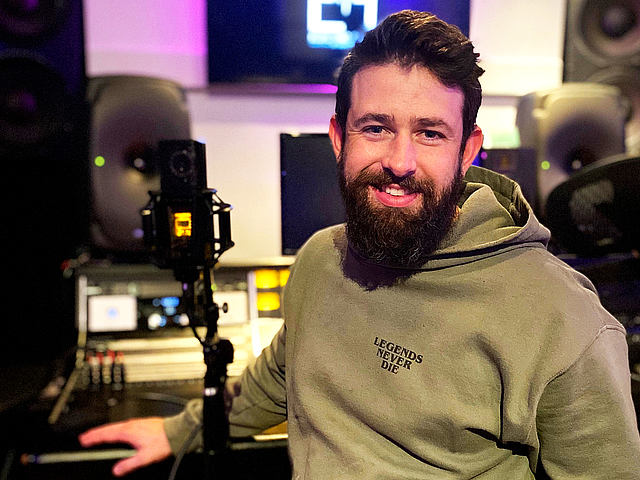
Today we are talking with Nick Mac. Nick Mac is the Chief Engineer of Electric Feel Studios.
Nick Mac started his career as a touring guitarist and made his way into recording and mixing artists in his native Southern California.
Nick's engineering credits are quite extensive, and they include artists like Post Malone, 24kGoldn, Iann Dior, YG, Macklemore, Ariel Pink, Machine Gun Kelly, Tyla Yaweh, Travis Barker, Yungblud, and more. More recently, Nick Mac played with Post Malone during his quarantine tribute to Nirvana.
Nick's strengths in audio production include recording live instruments, mixing, vocal production, and vocal editing.
Pensado's place studio tour with Nick Mac at Electric Feel Studios:
LEWITT: Nick, why did you choose to get into engineering?
Nick Mac: It just became a necessity for me. I was playing in bands and touring. At the time, there was nobody in the band to do pre-production or demos or anything, so I decided to do it myself and became fully immersed in the process. The demos came out pretty good, and it got everybody excited.
Eventually, I wanted to engineer from start to finish on my own and it just became an obsession.
LEWITT: Usually it's the bass player who becomes the sound man, and then becomes the engineer...
Nick Mac: I've heard the same thing. For me, I loved being able to experiment with sounds by myself and record myself and write without needing to have anyone else involved in the process. Obviously playing in a band you need all the other members but personally, my writing process usually starts by myself or with my drummer.
LEWITT: Do you remember your first recording?
Nick Mac: I recorded myself playing acoustic guitar using Sound Recorder on a PC with a little Logitech USB microphone. It was probably sometime in 2002 or something like that.
LEWITT: What pushed you to go on to the next level from that?
Nick Mac: The fact that the first recording came out so poorly, I had to redeem myself. It made me want to keep going and keep getting better until I got good at it. There were records, like City and Colour’s “Bring Me Your Love” and “Sometimes,” The Starting Line’s “Direction,” and Anberlin’s “Cities” that made me want to figure out how to assimilate my recordings.
LEWITT: How does your workflow differ from when you first started to when you got a little more experienced, to how it is today?
Nick Mac: When I first started, I did things intuitively versus based off of any technical foundation. I went to school and learned the basis of modern recording techniques and was able to have a baseline to work off of. Thankfully, I wasn’t too far off with my DIY approach and had been doing things relatively accurately.
Once I started working at Perfect Sound Studios in LA, I was doing sessions for major label artists which required more and I was operating under greater pressure to deliver quality results faster, better, and more consistently. There was no turning back from there. Once you’re put in that position you can’t expect any less from yourself. This was the point in my career where I gained the confidence to work with artists like Post Malone, 24kGoldn, Tyla Yaweh, YG, etc.
LEWITT: You had some big aha moments during the early part of your career. Were there any big ones at the school versus at the studio?
Nick Mac: A big aha moment in school for me was finding out that I didn’t need all the fancy gear to make the records I wanted to make. It’s about the song first, the artist and their needs, and honestly, a relatively small amount of technical knowledge to make it happen. I thought that, based on some of the iconic engineers that I admired, such as Jacquire King, Manny Marroquin, and Tony Maserati, that you needed a Neve or SSL to make a professional record, but in reality it’s about a really great song, the right energy in the room, and a passion for making the artist’s vision happen, to really make that person’s feelings come to life.
On the more technical side, signal flow was one of the most crucial things I ever learned in a studio environment. Where you are and where you want to go is the most important thing.
LEWITT: So, what kind of gear are you using at Electric Feel? What's your workflow there?
Nick Mac: I really like the API in our A room, we’re fortunate to have a couple of 1176’s, some Focusrite mic pres, SSL X-Logic rack, and all of our rooms feature Genelec speakers. My typical workflow at EF is a microphone usually into an ISA430, followed by an 1176, directly into my Apollo converter.
LEWITT: What's the difference between working with an upcoming artist and your A-list artists like Post Malone?
Nick Mac: The workflow for me isn't necessarily different. I come up with a system of checks and balances for myself as far as the technical side of things. I do the same for every session, how I'm receiving the audio, the levels that I'm looking at, gain staging, and then certain effects I'll obviously choose depending on the artist’s needs and tastes.
The thing that varies the most is seasoning and experience. The longer you do something the better you get at it. An up and coming artist has just started to discover themselves creatively but hasn’t quite figured out their formula yet. You might have to suggest things or convince them to try things more than you would with a more established artist like Post.
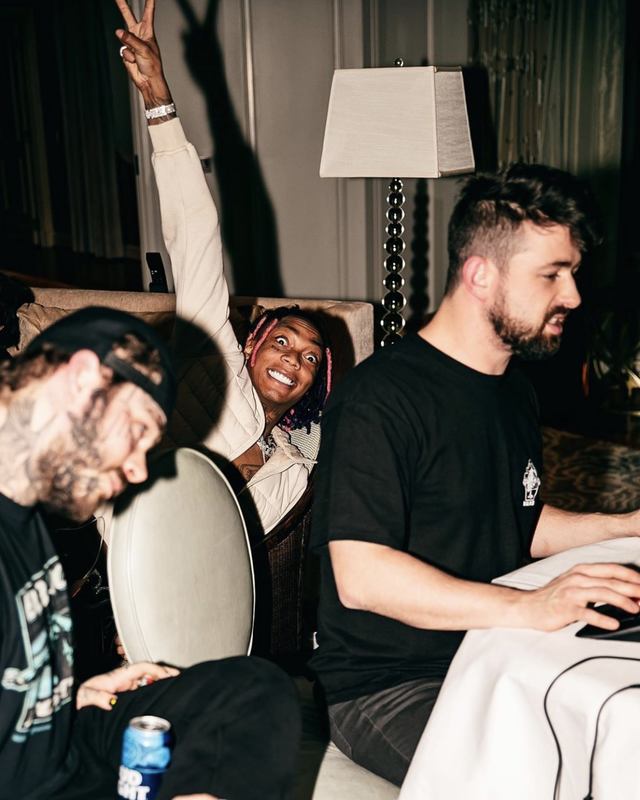
LEWITT: Do you view your gear as a tool, or do you have an emotional relationship with some of the pieces?
Nick Mac: I definitely have an emotional connection to my gear, but they are tools. Some pieces I may be more attached to than others. I enjoy remembering using certain pieces of gear on certain sessions and being able to recall those settings if I want to.
I still take recall sheets and everything, kind of old school.
It's kind of funny. Some of the assistants make fun of me for it, but anytime we use an analog piece of gear, I always write it down and write the date so I can remember what I did that day and how I did it. It's just kind of nice, so yeah, I'm very sentimental about things.
LEWITT: What do you do to get a good vibe for a session?
Nick Mac: There’s so many different things, and especially at Electric Feel, everything from the lighting to the scent to how the staff prepare the rooms… it’s signature. Our studio director, Danielle Engen, introduced a certain type of candle and sustainably harvested Palo Santo wood to our rooms, which has become our trademark incense palette for the studio and is my favorite part of a session at EF.
Aside from the ambiance and being in a positive, energetic mood, it’s about allowing the artist feel like it’s their space and giving them the environment to feel comfortable, creative, and safe.
LEWITT: You've worked at multiple studios throughout your career. What's special about Electric Feel?
Nick Mac: For me, it’s the people who work there and the songs that have been made there. There are so many great producers on our management roster who call it home and there’s a certain energy you feel when you walk in. It's not the biggest studio in the world, but some of the world’s biggest songs have been made there.
I also have an emotional attachment to EF because I’ve wired up all the studios. When I started, I redesigned the wiring layout of all of the rooms to better fit what our producers needed and working with our studio director we upgraded them with Genelec monitoring, new desks, and outboard gear.
LEWITT: Some artists like it when an engineer vocal produces or comes up with interesting ideas. Some artists don't. What’s your experience with this type of thing?
Nick Mac: I’ve definitely experienced both. There’s a time and place for everything. For instance, working with Post Malone, I usually let him do whatever he wants. I try not to interfere with his process. I will occasionally suggest ideas to him, but I know the parameters in the context of how we work together.
Someone like Tyla Yaweh, however, I’m much more involved in a producer role. Everything from the way I record his vocal, to final tuning and processing is all under the umbrella of things that I do for him.
LEWITT: So we also know you're a guitar player. What's your favorite guitar and why, if you have a favorite?
Nick Mac: I have three favorites. Two are Fender custom shop Strats, which are collectors items that I probably shouldn’t be playing, and a Les Paul gold top. My friend’s dad Jose Zepeda Sr. built the two Fender Strats. He’s a master builder and now works on their management team. He’s like a dad to me.
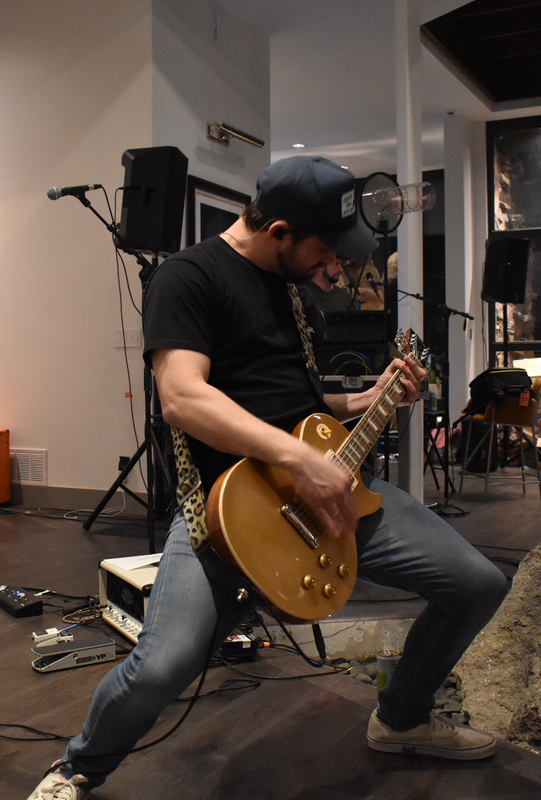
The Les Paul gold top is a favorite because I played that during the Post Malone Nirvana tribute show. It’s one my most important pieces because playing that show with my friends during the first part of the quarantine this year was extremely fun, but also significant because we helped raise a lot of money for the World Health Organization.
That guitar has a whole energy to it. When you have a Les Paul plugged into an amp and you just crank, there's nothing like it. It's not a vintage one, but the thing that I like about it is it's not chambered, because for a while, they were chambering them. I really like a heavy guitar. I don't have a problem with that. I think it feels like a vintage car.
When you turn a key in a vintage car and the engine starts, there’s just a certain weight to it. It feels sturdy. That's what I like in a Les Paul.
LEWITT: Now, as an engineer and sometimes producer too, what's your go-to vocal chain?
Nick Mac: If I'm in the box, I'll stay there. Usually, I’m using an Apollo. I've got meters that I pay very close attention to. I always use a channel strip type plugin. I’m a huge fan of Softube’s Console 1 and the integration with UAD plugins. The usual channel strip I’ll choose is the SSL 9000K and for vocals, I’ll use the SSL K Dynamics with the RMS detector followed by an 1176 rev A from UAD.
I've been using SSL stuff for years and that’s been an integral part of my workflow whether it’s an emulation or the real thing. I try to set up my sessions like working on a desk.
If I'm using hardware on the way in, I prefer to use my ISA430 with an 1176 straight into Pro Tools.
LEWITT: Do you prefer the hardware or the software?
Nick Mac: I would say both. I love the flexibility of software but love the hands-on tactile control of hardware, another reason why I really love Softube’s Console 1 and Fader. It’s a hardware controller for a software plugin with a bank of ten faders that allowed me to make EQ moves and automation passes as I would on a real SSL. But if I can use the real thing, I will. I love hardware. I'm guilty of that. I really love it.
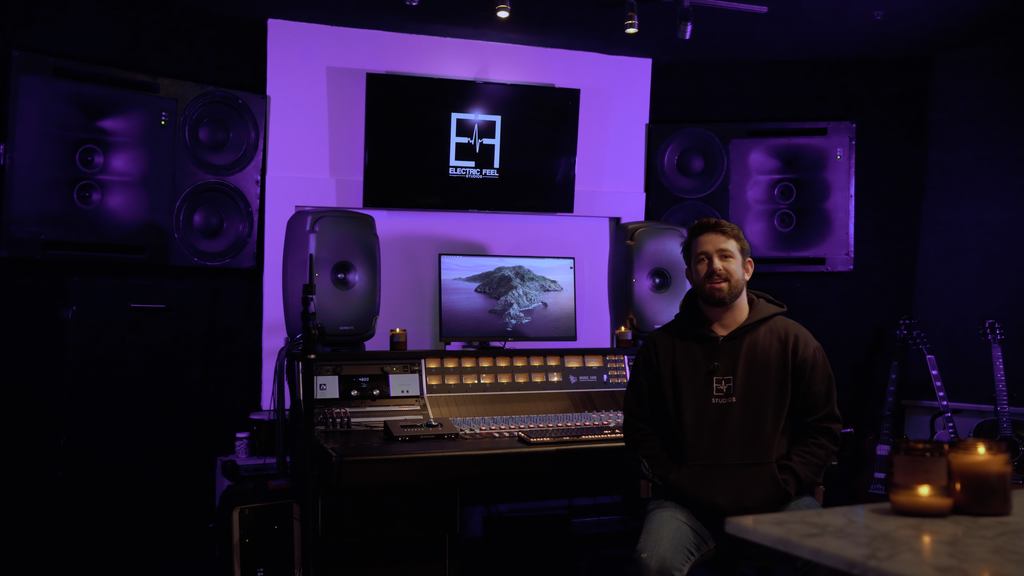
LEWITT: Now, when it comes to microphones, what makes a great microphone for you?
Nick Mac: For me, I feel I'm really sensitive to high-end. I don't like microphones that are necessarily just going to do this big boost thing. I really like it smooth. I also like to hear detail. I like to hear a nice, rich low-end, if it exists. Something that honestly represents the source is important to me too, because you can do so much manipulating in the box. You can do whatever you want on the back end in Pro Tools. I like to have the microphone be relatively honest to what's happening, and definitely not hyped too much in the high-end.
LEWITT: What was your first impression when you tried the LEWITT microphones?
Nick Mac: I was so excited. Genuinely, I've been looking at the LCT 840 for such a long time. I tried it and loved the results. It was very rich, full, and still present but not harsh on the top end.
I’ve been using a C800 throughout the majority of my sessions at EF because that’s typically what clients request but it’s not necessarily my first choice of microphone. Although it’s a great mic in its own right and sounds great on a lot of people, it’s not for everyone.
Everyone comments on the glowing tube. Clients ask, "What is that thing? It sounds so cool. What's the chain?” It gets them excited about things.
LEWITT: What do you like about the LCT 640 TS?
Nick Mac: I really enjoy the 640 TS. I’ve been using it a lot on guitar cabs and acoustic guitars for live performances of 24kGoldn and Iann Dior’s hit single, “Mood” lately. I feel like I can just put it up in front of the source and get what I want out of it. I always keep it as an option for acoustic guitars in the booth as well.
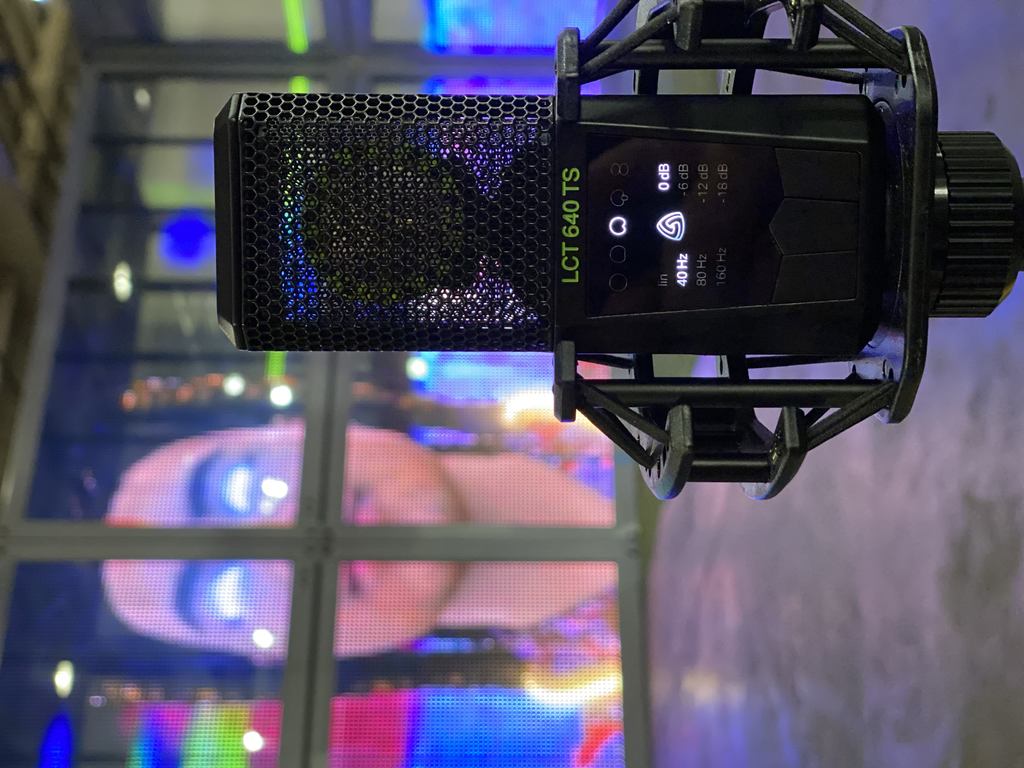
LEWITT: Can you tell us some of the artists you've recorded with LEWITT?
Nick Mac: Like I said, lately I’ve been using it with 24kGoldn and Iann Dior. I’ve also used the 840 with Tyla Yaweh, Joseph Black, River Green, and on plenty of writing sessions at EF. It’s been a great mic to be able to use and whenever I choose to use it, it sounds great.
LEWITT: That's on main vocals, correct?
Nick Mac: Yes, lead vocals. It feels very quality and I love the results I've been able to get with it. I'm really thankful to have it in the arsenal, honestly. It would be, if not the first, one of the first microphones I would grab for, for sure. A lot of my friends would say the same thing, too.
I have a couple of friends I always bounce things off of. I mentioned I was using it, and they're like, "Oh, I love that mic."
LEWITT: Do you have any other interesting upcoming projects that you'd like to talk about?
Nick Mac: This year has been mostly me recording and touring with Post. We’re obviously working on his new record. It’s been the big ticket item of the year.
Aside from that, I’ve been recording and mixing a lot of live performances. For instance, the live performance of 24kGoldn’s “Mood” on Jimmy Kimmel, Ellen, and the MTV EMAs and shows for Iann Dior including his recent GrubHub Sound Bytes performance.
There’s always tech work to be done to keep EF up to standards. I’ll be finishing out this year maintaining the rooms and consoles and of course more mixing as well.
LEWITT: You're very lucky you have the ability to keep working, and making great records, that are really received well.
Nick Mac: Thank you. Yeah, I couldn't agree more. I just want to comment on that too. I know a lot of people have had a hard time this year, and I'm nothing but thankful for all the people that I'm able to work with and the team, my management, everything. I'm just happy to be here, just grateful. It's a blessing, and I appreciate LEWITT for the support. Thank you so much.